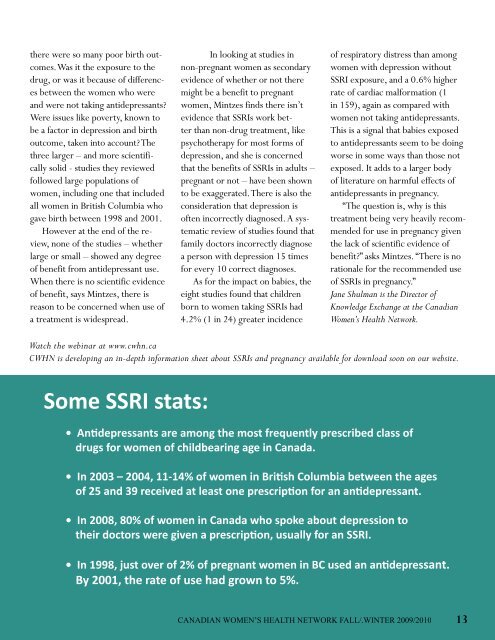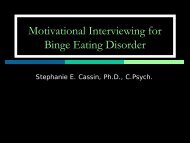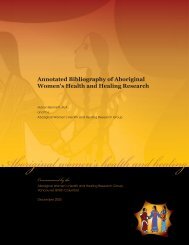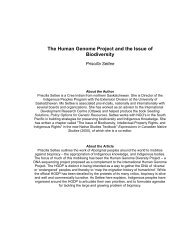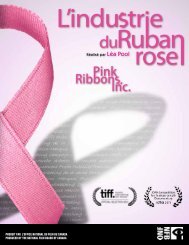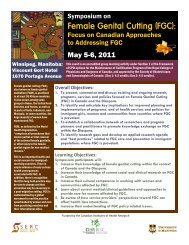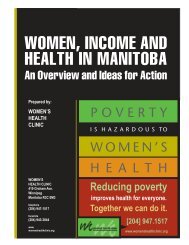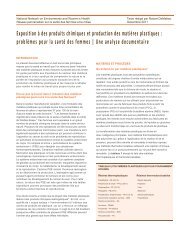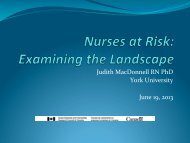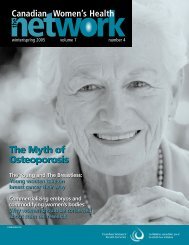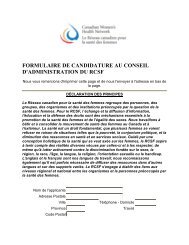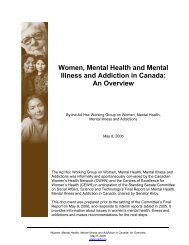Network 12-1.pdf - Canadian Women's Health Network
Network 12-1.pdf - Canadian Women's Health Network
Network 12-1.pdf - Canadian Women's Health Network
You also want an ePaper? Increase the reach of your titles
YUMPU automatically turns print PDFs into web optimized ePapers that Google loves.
there were so many poor birth outcomes.<br />
Was it the exposure to the<br />
drug, or was it because of differences<br />
between the women who were<br />
and were not taking antidepressants?<br />
Were issues like poverty, known to<br />
be a factor in depression and birth<br />
outcome, taken into account? The<br />
three larger – and more scientifically<br />
solid - studies they reviewed<br />
followed large populations of<br />
women, including one that included<br />
all women in British Columbia who<br />
gave birth between 1998 and 2001.<br />
However at the end of the review,<br />
none of the studies – whether<br />
large or small – showed any degree<br />
of benefit from antidepressant use.<br />
When there is no scientific evidence<br />
of benefit, says Mintzes, there is<br />
reason to be concerned when use of<br />
a treatment is widespread.<br />
In looking at studies in<br />
non-pregnant women as secondary<br />
evidence of whether or not there<br />
might be a benefit to pregnant<br />
women, Mintzes finds there isn’t<br />
evidence that SSRIs work better<br />
than non-drug treatment, like<br />
psychotherapy for most forms of<br />
depression, and she is concerned<br />
that the benefits of SSRIs in adults –<br />
pregnant or not – have been shown<br />
to be exaggerated. There is also the<br />
consideration that depression is<br />
often incorrectly diagnosed. A systematic<br />
review of studies found that<br />
family doctors incorrectly diagnose<br />
a person with depression 15 times<br />
for every 10 correct diagnoses.<br />
As for the impact on babies, the<br />
eight studies found that children<br />
born to women taking SSRIs had<br />
4.2% (1 in 24) greater incidence<br />
of respiratory distress than among<br />
women with depression without<br />
SSRI exposure, and a 0.6% higher<br />
rate of cardiac malformation (1<br />
in 159), again as compared with<br />
women not taking antidepressants.<br />
This is a signal that babies exposed<br />
to antidepressants seem to be doing<br />
worse in some ways than those not<br />
exposed. It adds to a larger body<br />
of literature on harmful effects of<br />
antidepressants in pregnancy.<br />
“The question is, why is this<br />
treatment being very heavily recommended<br />
for use in pregnancy given<br />
the lack of scientific evidence of<br />
benefit?” asks Mintzes. “There is no<br />
rationale for the recommended use<br />
of SSRIs in pregnancy.”<br />
Jane Shulman is the Director of<br />
Knowledge Exchange at the <strong>Canadian</strong><br />
Women’s <strong>Health</strong> <strong>Network</strong>.<br />
Watch the webinar at www.cwhn.ca<br />
CWHN is developing an in-depth information sheet about SSRIs and pregnancy available for download soon on our website.<br />
Some SSRI stats:<br />
• Andepressants are among the most frequently prescribed class of<br />
drugs for women of childbearing age in Canada.<br />
• In 2003 – 2004, 11-14% of women in Brish Columbia between the ages<br />
of 25 and 39 received at least one prescripon for an andepressant.<br />
• In 2008, 80% of women in Canada who spoke about depression to<br />
their doctors were given a prescripon, usually for an SSRI.<br />
• In 1998, just over of 2% of pregnant women in BC used an andepressant.<br />
By 2001, the rate of use had grown to 5%.<br />
CANADIAN WOMEN’S HEALTH NETWORK FALL/.WINTER 2009/2010 13


